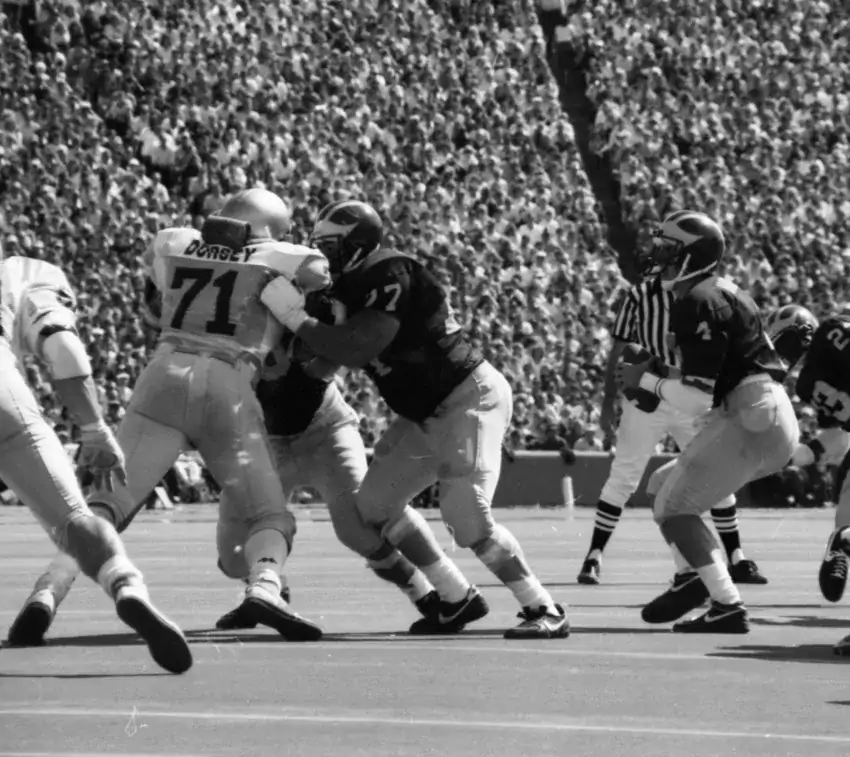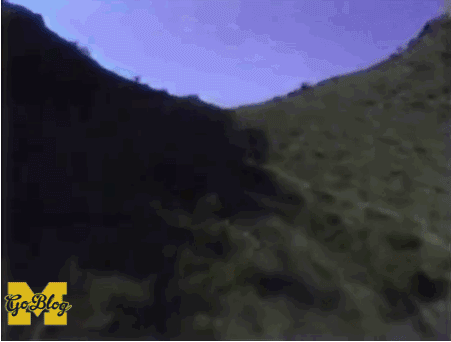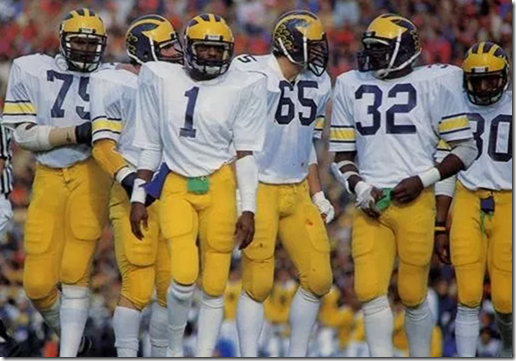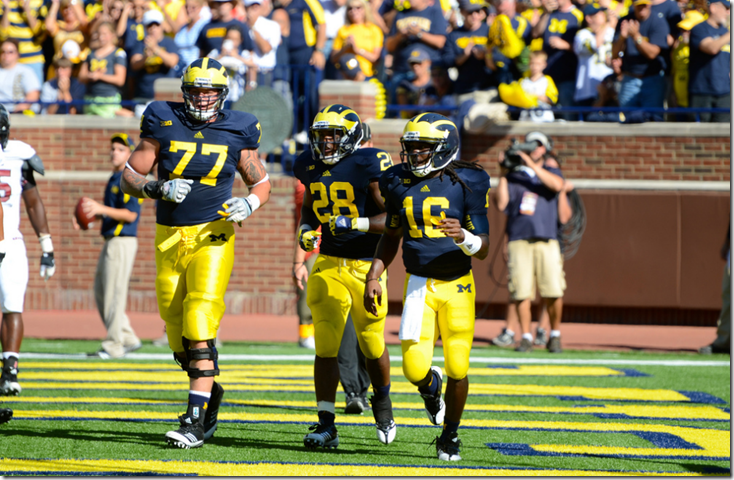jamie morris

Previously: Krushed By Stauskas (Illinois 2014), Introducing #ChaosTeam (Indiana 2009), Revenge is Terrifying (Colorado 1996), Four Games In September I (Boston College 1991), Four Games In September II (Boston College 1994), Four Games In September III (Boston College 1995), Four Games In September IV (Boston College 1996), Pac Ten After Dark Parts One and Two (UCLA 1989)
This Game: ESPN Classic abridged cut (warning: inexplicable editing decisions), no huddle every-snap, WH highlights, box score
 some feared the worst heading into the '85 season opener [Daily archives]
some feared the worst heading into the '85 season opener [Daily archives]
For most of the rivalry's history, Michigan vs. Notre Dame has been an early-season matchup that threatens to dash the national title hopes of at least one of the programs. The expectations are different heading into the 1985 season.
Notre Dame coach Gerry Faust, infamously hired straight from Cincinnati Moeller High School, is on the hot seat after failing to finish better than 7-5 in any of his first four seasons. Michigan, meanwhile, is coming off Bo Schembechler's worst-ever season of 6-6, which went to hell when sophomore quarterback Jim Harbaugh broke his arm against Michigan State. The Wolverines have produced a combined three draft picks over the last two years; there'd been 14 in the previous two.
The Michigan Daily does its best to hype up the game, going so far as to give it a name that belongs elsewhere:
Usually when these two squads meet, both are in the top ten if not in the top twenty. Usually when these two teams meet, both boast a large corps of talented returners. Usually when these two tradition rich legions collide, both return from highly successful prior seasons.
Well football fans, some of this has changed.
When the Fighting Irish invade Michigan Stadium tomorrow to knock heads with the Wolverines, neither team will boast a top ten ranking, a huge number of talented returners, or a good 1984 record (Michigan was 6-6 and Notre Dame was 7-4). But still, all the importance, pressure, and rivalry is present.
It is The Game.
There's not a lot of optimism, however. This feels like a passage from Bizarroworld knowing how the 1985 season would turn out:
Today's Michigan football trivia question: When was the last year the Wolverines posted a losing record? Give up? The answer is 1967 when Bump Elliott's squad finished at 4-6.
Two years later, Bo Schembechler took over as head coach and has still not had a losing record. Last season, however, Schembechler's streak almost came to a rapid end when his team went an un-Michiganlike 6-6. Could this mean the infamous losing season is right around the corner? One can only guess.
One thing certain is that Michigan will not enter the 1985 campaign with their usual high ranking, their usual host of All-America and All-Big Ten selections or their usual chance for the Big Ten title.
The Michigan of 1985 has no spotlight-type stars-at least not yet. The team will begin with a humble billing and only winning will alter it.
And winning could be a burdensome task this season. The Wolverines face their toughest schedule in years. They play nine teams that appeared in bowl games last year. Indiana and Minnesota are the only non-bowl opponents. (Northwestern is not scheduled).
While Harbaugh is healthy, Michigan has a ton of turnover in the trenches, having lost two starters on the offensive line and five of their starting front seven on defense. The entire receiving corps is new, too, with sophomore Eric "Soup" Campbell—the future M receivers coach—starting on the outside after playing safety in 1984. It's unsure whether free safety Tony Gant will return to form because a broken leg the previous year may have caused nerve damage.
According to John Kryk's Natural Enemies, Schembechler threatens to bench Harbaugh after the first-string defense picks him off twice in the final preseason scrimmage:
"The offense couldn't do anything right," remembered Harbaugh. "We got a major chewing out from Bo. He ripped me in particular, and threatened to start Chris Zurbrugg instead."
Bo doesn't follow through on his threat, to the relief of everyone who sat through the 1984 season.
Despite Faust's middling record, Notre Dame is the favorite, entering the season ranked 13th and 11th in the polls; Michigan isn't in the top 20, which is as far as the rankings go. The Irish boast the game's Heisman candidate in senior running back Allen Pinkett, who surpassed 1,300 scrimmage yards and scored 18 touchdowns in each of the last two seasons. The Wolverines have history on their side, however: Schembechler has never lost a season opener at home.
[Hit THE JUMP for the first half, featuring Unstoppable Kick God John Carney.]

Last offseason I was making these Michigan All-____ Teams and I didn't get around to all of the ideas. So let's.
Previously:
- Ancient History: 1879 to 1968
- The 5-stars
- The 3-stars
- The Extracurriculars
- Position-Switchers
- Highlights
- All-Numbers Team Part I: The Offense
- All-Numbers Team Part II: The Defense
- The Best of Michigan (the state)
- All-Name Team
Today's Rules: You must be in the bottom quartile of height for your position and get extra points for being shorter than that. Weight doesn't matter as much as height (because most of these guys had to add a lot of it). Also this has to be relative to the players of your era—with a heavy recency bias—because there was a time when a six-foot offensive tackle was considered huge. For example, here's 5'11" Anthony Carter with some of the other 1979 offensive starters (via a Dr. Sap article on MVictors):
I'm going to use my discretion as we go, but if a player wasn't remarkably tiny for his era, even if he would be in ours, he doesn't count.
The problem: Rosters lie, especially regarding these players, because listing a short guy at his real height could depress his pro future. Where I have knowledge of a guy's actual height I'll use that, and beyond that I'm just going to do my best.
Quarterback: Denard Robinson
Last listed size: 6'0"/197 (2012)
[Brian Fuller]
Strangely, 2019 recruit Cade McNamara, at 6'1", is the third-shortest Michigan scholarship quarterback since Bo, with Denard and 2008 proto-Denard Justin Feagin both listed at a straight six. Or maybe that's not so strange because height in a quarterback is so highly valued. In my opinion it's highly overrated; the last two Heisman winners were Oklahoma quarterbacks listed at 6'0" and 5'11", QED. Notably, despite Michigan's clear preference for tall guys, some of their best were all on the shorter side, including Chad Henne and Shea Patterson, both just 6'2". Anyway, the rosters lied about Denard's height, which was probably 5'11" or just under it. I should mention the 2011 roster lists Denard as 5'9", which is wrong but feels right. His height led to a few batted balls, but since his center also appears later on this list (and Ricky Barnum wasn't very tall either), and because defenders in space had to approach warily lest Denard escape the pocket, the % of batted balls from Denard in the UFRs is lower than that for Henne.
Honorable Mention: Dennis Brown (5'10"/175), Tate Forcier (6'1"/190), Harry Newman (5'7"/174), Boss Weeks (5'7"/161) lots of other old dudes. Michigan's first great quarterback (and college athletics' first great athletic director) Charles Baird was listed at 5'6". Michigan's shortest QB on the Bentley database was 1914-'16 bencher Harold Zeiger, at 5'4".
[After THE JUMP: Not who you think]
Previously: 1984 Miami, 1985 Notre Dame, 1985 South Carolina, 1985 Minnesota, 1985 Ohio State

The Highlights: WolverineHistorian
The Setup: Although Michigan finished second in the Big Ten to Iowa, their victory over Ohio State earned them a top-notch bowl bid; the fifth-ranked Wolverines would face off against the sixth-ranked Nebraska Cornhuskers, who'd climbed as high as #2 in the polls before falling to Oklahoma in their regular season finale.
The Wolverines were looking for their tenth win of the season. Bo Schembechler also wanted to improve his 2-10 bowl record. He'd have to do it in his first matchup against Tom Osborne.
[Hit THE JUMP.]


10